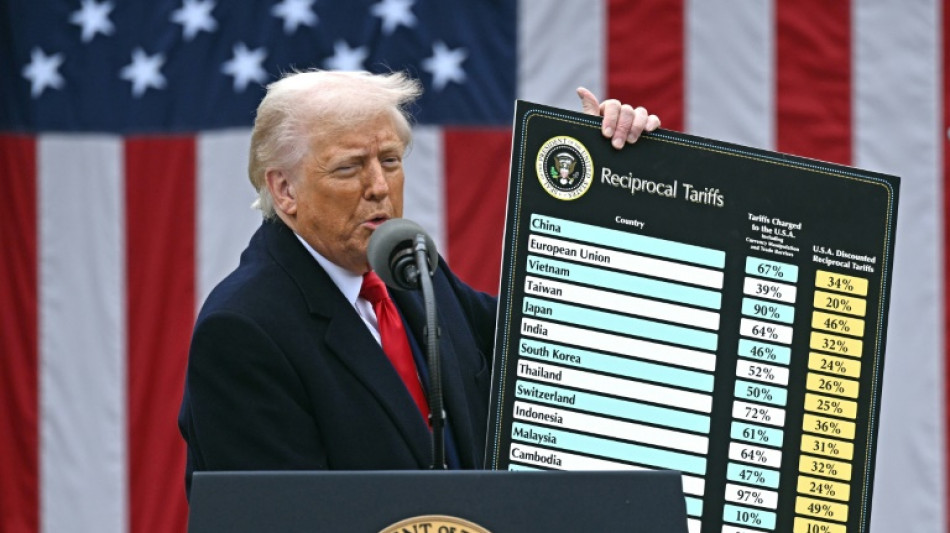
Trump says to set 50% copper tariff, no extension to August deadline

President Donald Trump said Tuesday that he would not extend an August 1 deadline for higher US tariffs to take effect on dozens of economies, while announcing plans for a 50 percent duty on copper imports.
The copper levy would come on the back of an ongoing probe into imports of the metal, broadening a slate of sector-specific tariffs Trump has imposed since returning to the White House.
"Today we're doing copper," he told a cabinet meeting Tuesday, indicating progress in the investigation. "I believe the tariff on copper, we're going to make it 50 percent."
Trump also said Washington would soon make an announcement on pharmaceuticals, but officials would allow manufacturers time to relocate their operations into the country.
"We're going to give people about a year, a year and a half to come in, and after that, they're going to be tariffed," he said. "They're going to be tariffed at a very, very high rate, like 200 percent."
Apart from copper and pharmaceuticals, Trump has ordered probes into imports of lumber, semiconductors and critical minerals that could lead to further levies.
And beyond duties impacting certain sectors, Trump separately slapped a sweeping 10 percent tariff on goods from almost all trading partners in April.
These would have risen to steeper levels for dozens of economies including the European Union and Japan, but Trump had paused their implementation until July 9.
The president this week again delayed their reimposition, pushing it to August 1 but insisting there would be no further delay.
- 'No extensions' -
In a social media post Tuesday, Trump said the United States would start collecting the updated tariffs on August 1, in line with letters now being sent out to trading partners.
"No extensions will be granted," he posted on Truth Social. "There will be no change."
The clarification came after Trump told reporters Monday night that the August 1 deadline was "firm, but not 100 percent firm."
In a push for further trade deals, Trump sent letters to more than a dozen partners on Monday, including key US allies Japan and South Korea.
Products from both countries would be hit with 25 percent duties, Trump wrote in near-identical documents to leaders in Tokyo and Seoul.
Indonesia, Bangladesh, Thailand, South Africa and Malaysia were among other countries facing duties ranging from 25 percent to 40 percent.
Most countries receiving the letters so far saw US tariffs at similar or unchanged rates from those threatened in April, although some like Laos and Cambodia received notably lower levels.
In his messages to foreign leaders, Trump warned of further escalation if there was retaliation against his levies.
- 'Two days off' -
At a cabinet meeting Tuesday, Trump insisted that "big money will start coming in on August 1."
US Treasury Secretary Scott Bessent added at the meeting that tariff income could exceed $300 billion by year-end.
The Trump administration is under pressure to show results after promising a flurry of deals following the tariff threats.
Trump said Tuesday that Washington was "probably two days off" from sending the EU a letter setting out an updated tariff rate that the bloc would face.
"They're very tough, but now they're being very nice to us," he said. "We are talking to them."
So far Washington has only struck two pacts, with Britain and Vietnam, besides an agreement to dial back staggeringly high tit-for-tat levies with China.
And US talks with Britain are ongoing over steel and aluminum duties.
Trump recently doubled US tariffs on imports of both metals to 50 percent while exempting the UK from this increase. But Washington could double the levy on UK steel and aluminum too starting Wednesday, if it determined that London had not complied with the terms of their deal.
In threatening tariff hikes on various economies, Trump cited in his letters a lack of reciprocity in trading ties.
He also warned that goods transshipped to avoid higher duties would be subjected to steeper levels.
But he added that if countries were willing to adjust their trade policies, Washington "will, perhaps, consider an adjustment to this letter."
P.Barry--TNT